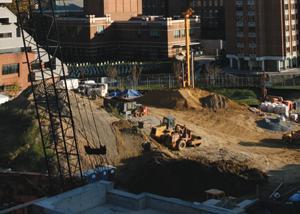The university has halted construction of Georgetown’s new science building until financial markets stabilize, according to several university officials.
Since the conception of the new science facility, funding for the building’s construction -estimated at over $100 million – has been based on both philanthropy and borrowing. Now, given economic volatility, the significant debt the university would incur through borrowing is considered too significant a risk. Without these funds, construction of the building-originally slated for completion by 2011-will face delays.
In a Nov. 5 statement, University President John J. DeGioia offered his perspective on the current financial position of the university and its plans for future responses to economic change.
“It terms of campus operating budgets . the campuses are implementing a set of steps to give Georgetown even greater fiscal flexibility in the event of significant changes to our revenue or expense projections,” he wrote. “For example, we are delaying discretionary capital projects that are not otherwise funded until the resolution of the credit crisis.”
University Spokesperson Julie Bataille said that Georgetown will need to borrow approximately $50 million as part of the financial plan to cover construction costs for the new facility.
“We’d typically do this by selling debt in capital markets, which are currently so volatile,” she said. “We continue to monitor the credit market to determine the appropriate time and mechanism to seek these transactions given all of the volatility but are committed to moving forward with building a new science facility when this is possible.”
At a town hall meeting on Sept. 25, DeGioia said that the university would complete construction of the science building no matter what the state of the nation’s economy, but he added that it needed to plan responsibly in order to cover operating costs once the building opened.
“Typically, we go to the capital markets and offer to sell debt,” DeGioia said at the meeting. “Right now, the capital markets in which we would seek to sell our debt are not functioning in an optimal manner. This is the challenge we face with the science building.”
University Provost James O’Donnell said in an e-mail yesterday that “the building will go forward when funding is ready.”
Paul Roepe, professor and chair of the chemistry department, said that some faculty members were informed two to three weeks ago about the delays to pending capital projects, which includes the construction of the science center.
Roepe said he received an e-mail on Oct. 27 from Christopher Augostini, the university’s senior vice president, CFO and treasurer, which stated that in light of challenging financial times, all capital projects that are currently underway will continue as planned, while any new capital projects, including the science center, will be delayed and “will commence as soon as the situation allows.”
Amid the financial crisis, Roepe said concerns over the financing of the project have been growing.
“People have been worried about this for a long time, ever since the economy started to act funny back in September,” Roepe said. “Everyone’s obviously a little disappointed that there’s a delay in this. This is not fun for anybody.”
Constructing a new science building has been a primary focus of the university for over a decade. The university designated the proposed science center as the main campus’s top priority during the Third Century Campaign, a six-year fund drive started in 1995 which ultimately raised $1 billion.
Roepe said he believes that university administrators continue to keep the project at the forefront of their agenda.
“They’ve been telling the faculty that constructing the new science center is still the number one academic priority,” Roepe said. “They’ve been saying that, and I believe them.”
As for whether the targeted 2011 completion date will be met, Bataille said it depends on a number of different factors.
“It is difficult to project an exact time frame due to the uncertainty of not only the permit and approval process required to begin construction in the District of Columbia but also our ability to put in place a sound financial framework given the current economic volatility in the U.S. and global financial markets,” she said.
While actual construction has not begun yet, some utility work has already been completed, Bataille added.
“








